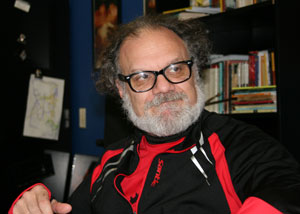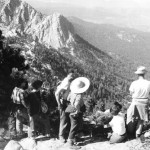
Photo by Marshall Smith
For J. Barrett Cooper, Idyllwild Arts Academy Theatre Department chair, a playwright’s words are the most important component in producing and presenting a play. “I’m not going to lose the play for a director’s concept,” he said. “The text must support the concept. We serve the playwright, not the director’s concept of a play.”
He referenced the New Testament John 1:1: “In the beginning was the word …”
Cooper has long been a professional actor and director, as well as a teacher. Of his years as a teacher, Cooper said, “I always tell these kids, ‘Go for the truth, for the honesty — for the truth of the word, the character and the line.’
“In the theater, it’s always about what we say and how we say it.” His advice to actors, learned from studying Stanislavsky’s theories of actions and objectives, is, “Know what you want, know what you need and how you’re going to get it.”
And from childhood, around age 6, Cooper knew what he wanted. He began by being interested in both sports and acting, but since he never grew into the middle linebacker he had hoped to become, his career settled into one of acting and directing in his native Louisville, Kentucky.
But early on, there had always been a deeply ingrained interest in acting. After seeing the movie “Patton” when he was in second grade, he found a knack for memorization and a fascination with text. “I had Patton’s speech memorized in second grade, the speech that begins, ‘Men, all this stuff you hear about America not wanting to fight, wanting to stay out of the war, is a lot of bull---t. Americans love to fight. All real Americans love the sting and clash of battle. When you were kids, you all admired the champion marble shooter, the fastest runner, the big-league ball players and the toughest boxers. Americans love a winner and will not tolerate a loser. Americans play to win all the time.” In interview, Cooper could still riff on the speech, delivering it with the commitment and attitude of which the august general would have approved.
Cooper remembered his older sister took him and his younger sister to movies all the time. “I saw the Franco Zeffirelli movie of ‘Romeo and Juliet’ four times. At the age of 6, I had the prince’s speech memorized. That began my early fascination with Shakespeare.”
Cooper’s fascinations were across the board. “By seventh grade, I worshipped the Marx Brothers. I recorded the movie ‘The Big Store’ so I could memorize the monologues of the characters. I was always able to make my family laugh and I began to think I could do this [acting] thing.”

And, as a teacher, he remembered how important one teacher had been in his life and chosen career. “Nancy Sexton started a theater program at the school I was attending,” he said. “By the time I graduated, I had over 20 plays as an actor as part of my résumé. I realized this is what I wanted to do, that I didn’t like anything else. It was the attention. I could make my mother smile and that would break the tension in our sometimes difficult family situation.”
Cooper spoke of his father’s alcoholism, exacerbated when a tornado passed directly over the house his father had just remodeled. The cell 5 tornado demolished the house and traumatized the family who were inside at the time. They survived with no major injuries but with deep emotional scars. “My father was never the same afterward,” said Cooper. “Those years were really tough, but acting gave me a focus.”
Cooper’s agility in sports equipped him for staging fight choreography, one of the constants in his teaching and professional theater career. Cooper acted professionally in the Actors Theatre of Louisville, in his own company, the Savage Rose Classical Theatre Company, in the Arkansas Repertory Theatre, and with the University of Alabama Shakespeare Festival. He received a bachelor of fine arts in acting from Southern Methodist University in Dallas and a masters of fine arts in acting from the University of Alabama. Cooper confided he went to SMU, not only because of its acting program, but also because it had football team. “I also liked Dallas because I’m a massive Cowboys fan.”
Asked whether he liked acting or directing more, Cooper hesitated. “Having directed so many plays, I have a strong sense of the integrity of the playwright’s words and what the author intended,” he said. “Getting to be just an actor is fun, and there is also, and needs to be, so much trust [in the director]. But if the director is not honoring the playwright, that can create tension for me as an actor.”
As Cooper said at the beginning, and as his career and commitment as an actor and director have demonstrated, “In the beginning was the word,” and the word was everything.










